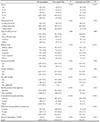1. Lee S, Jee SH. World Health Organization's recommendation on heat-not-burn tobacco products and its' application to Korea. J Korean Soc Res Nicotine Tob. 2017; 8(2):55–57.

5. Simonavicius E, McNeill A, Shahab L, Brose LS. Heat-not-burn tobacco products: a systematic literature review. Tob Control. 2019; 28(5):582–594.

6. Auer R, Concha-Lozano N, Jacot-Sadowski I, Cornuz J, Berthet A. Heat-not-burn tobacco cigarettes: smoke by any other name. JAMA Intern Med. 2017; 177(7):1050–1052.
7. Sutanto E, Miller C, Smith DM, O'Connor RJ, Quah ACK, Cummings KM, et al. Prevalence, use behaviors, and preferences among users of heated tobacco products: findings from the 2018 ITC Japan Survey. Int J Environ Res Public Health. 2019; 16(23):4630.

8. Czoli CD, White CM, Reid JL, OConnor RJ, Hammond D. Awareness and interest in IQOS heated tobacco products among youth in Canada, England and the USA. Tob Control. 2020; 29(1):89–95.

9. Tabuchi T, Kiyohara K, Hoshino T, Bekki K, Inaba Y, Kunugita N. Awareness and use of electronic cigarettes and heat-not-burn tobacco products in Japan. Addiction. 2016; 111(4):706–713.
10. Kang H, Cho SI. Heated tobacco product use among Korean adolescents. Tob Control. 2019; 1. 1. [Epub ahead of print].

11. Kim J, Yu H, Lee S, Paek YJ. Awareness, experience and prevalence of heated tobacco product, IQOS, among young Korean adults. Tob Control. 2018; 27:Suppl 1. S74–S77.

14. Lee C, Kim S, Cheong YS. Issues of new types of tobacco(e-cigarette and heat-not-burn tobacco): from the perspective of ‘tobacco harm reduction’. J Korean Med Assoc. 2018; 61(3):181–190.
15. Ahn HK, Lee HJ, Jung DS, Lee SY, Kim SW, Kang JH. The reliability and validity of Korean version of questionnaire for nicotine dependence. J Korean Acad Fam Med. 2002; 23(8):999–1008.
16. Wu YS, Wang MP, Ho SY, Li HCW, Cheung YTD, Tabuchi T, et al. Heated tobacco products use in Chinese adults in Hong Kong: a population-based cross-sectional study. Tob Control. 2019; 04. 20. [Epub ahead of print].

17. Khang YH, Cho HJ. Socioeconomic inequality in cigarette smoking: trends by gender, age, and socioeconomic position in South Korea, 1989-2003. Prev Med. 2006; 42(6):415–422.

18. Lee Y, Lee KS. Factors related to smoking status among young adults: an analysis of younger and older young adults in Korea. J Prev Med Public Health. 2019; 52(2):92–100.

19. Wang Q, Shen JJ, Sotero M, Li CA, Hou Z. Income, occupation and education: are they related to smoking behaviors in China? PLoS One. 2018; 13(2):e0192571.

20. Hair EC, Bennett M, Sheen E, Cantrell J, Briggs J, Fenn Z, et al. Examining perceptions about IQOS heated tobacco product: consumer studies in Japan and Switzerland. Tob Control. 2018; 27:Suppl 1. s70–s73.

21. McKelvey K, Popova L, Kim M, Chaffee BW, Vijayaraghavan M, Ling P, et al. Heated tobacco products likely appeal to adolescents and young adults. Tob Control. 2018; 27:Suppl 1. s41–s47.

22. Okechukwu CA, Nguyen K, Hickman NJ. Partner smoking characteristics: associations with smoking and quitting among blue-collar apprentices. Am J Ind Med. 2010; 53(11):1102–1108.

23. Joung MJ, Han MA, Park J, Ryu SY. Association between family and friend smoking status and adolescent smoking behavior and E-cigarette use in Korea. Int J Environ Res Public Health. 2016; 13(12):1183.

25. Hackshaw A, Morris JK, Boniface S, Tang JL, Milenković D. Low cigarette consumption and risk of coronary heart disease and stroke: meta-analysis of 141 cohort studies in 55 study reports. BMJ. 2018; 360:j5855.

26. Zhou X, Nonnemaker J, Sherrill B, Gilsenan AW, Coste F, West R. Attempts to quit smoking and relapse: factors associated with success or failure from the ATTEMPT cohort study. Addict Behav. 2009; 34(4):365–373.

27. Lee JS, Kang SM, Kim HJ, Lee KY, Cho B, Goh E. Long-term maintenance of smoking cessation and related factors of relapse. Korean J Fam Med. 2009; 30(3):203–209.

28. Bold KW, Rasheed AS, McCarthy DE, Jackson TC, Fiore MC, Baker TB. Rates and predictors of renewed quitting after relapse during a one-year follow-up among primary care patients. Ann Behav Med. 2015; 49(1):128–140.

29. Cho HJ. Issues related to e-cigarettes use. J Korean Soc Res Nicotine Tob. 2016; 7(2):61–65.






 PDF
PDF ePub
ePub Citation
Citation Print
Print




 XML Download
XML Download